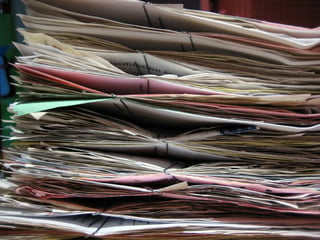Things can get a bit crazy at tax time, there is so much information to keep track of and provide to the preparer (CPA or Enrolled Agent - EA) or IRS. As we make our way through the piles and files of receipts and statements left over from tax time, disposing of some of these obstacles is a thought. It is always suggested to carefully shred documents containing any critically sensitive information.
 The idea is to toss out what you don’t need anymore, yet keep what you might need for income taxes and accounting purposes. Here are some items that accumulate the most with a note as to how long to keep them:
The idea is to toss out what you don’t need anymore, yet keep what you might need for income taxes and accounting purposes. Here are some items that accumulate the most with a note as to how long to keep them:
Monthly Utility Statements - can be disposed of after three months unless the expenses are being written off for tax purposes, then you may want to maintain those until after tax time.
Pay Stubs – having the most recent pay stub handy is suggested, with no need to keep older stubs since the most recent stub should contain all YTD details. Should you be applying for a loan or mortgage, then having as much as one year’s stubs available is helpful.
Credit Card Receipts & Statements – can be tossed when the credit card statement is received and reviewed. If using a credit card for business purposes, then keeping receipts for seven years is the recommended time period. Statements on the other hand should be kept for three months should there be a dispute or chargeback of an expense.
Canceled Checks – can be shredded once the bank statement arrives. Credit card receipts and business related expenses should be kept for seven years. Most people don’t get their canceled checks back any more, but if a photo copy comes with the bank statement treat these the same as a canceled check.
Bank Statements – are possibly the most important items to keep for an extended period. Like pay stubs, if a loan or mortgage application is in process, six to twelve months of statements is what most lenders are asking for nowadays.
Insurance – always replace outdated policies and coverage verifications with the most recent and keep in an accessible place should a claim need to be filed.
Medical Statements, Bills & Insurance Notices – should be kept for at least five years especially if these items are used as tax deductions and even lingering insurance payment claims. With the onslaught of recent health care initiatives, it is wise to track and file all medical related items as detailed as possible.
Tax Returns & Supporting Items - should be kept at least seven years. Supporting documents include receipts, mileage logs, spreadsheets, paid invoices and canceled checks.
For business owners, this is a good time to “clean house” and get rid of old information (back eight years) get rid of that box or file of receipts and tax returns. That would be seven years for the tax return filed (2015 - 7 years = 2008) So throwing away stuff from 2007 should be safe.
After selecting all the stuff to get rid of, I think it is just easier to shred it all. Here is why: 1) you may have inadvertently left an important document in the stack to throw out, this way you know everything is destroyed properly. 2) the shredded paper is easier to recycle. 3) it also makes a good fire starter for your next camping trip! Having burned up a couple shredders in the past its worth the money to get a good one.
It is also a good time to check tax planning for the year, don't wait until year end to plan - are you on track? Learn some new tax rule changes, and a couple big income tax problems for this year. Good luck cleaning House!
REMEMBER:
The income tax has made liars out of more Americans than golf. - Will Rogers



